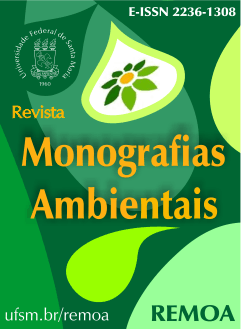National Park Mountain Itabaiana-SE: Reality and management
DOI:
https://doi.org/10.5902/2236130815005Keywords:
Ecotourism, Visitation, Environmental education, Conservation unitsAbstract
Ecotourism is an activity expanding due to direct contact with nature visitor. This practice can be developed in areas called protected areas, and the category of national park is the most sought by visitors because this has many attractions, enabling the development of environmental education activities in order to alert visitors to not there is such an impact during his visitation. The mountain National Park Itabaiana is a conservation unit that receives visitations on their historical, religious and cultural significance of the mountain. However, disordered visitation is causing serious impacts to trails and attractive points. In this context, the present study aimed to survey the infrastructure and the impacts caused by visitors to the mountain PARNA Itabaiana. For this, a semi-structured questionnaire with different visitors several interesting sites and access roads within the national park was applied. For them, the PA provides not only recreational and ecological benefits as a natural resource, demonstrating a bit keen insight. The monitoring visits will allow the planning of management activities, to meet the needs of its patrons. We suggest the implementation of environmental education programs using techniques of environmental interpretation to sharpen the sensitivity of existing visitor on environmental issues within the PARNA, such as drafting a quick visit with a proper language to the type of visitor that frequents the park.Downloads
References
CARVALHO, C. M. de; VILAR, J.C. Parque Nacional Serra de Itabaiana: levantamento da biota. São Cristóvão: UFS; Aracaju: IBAMA, 2005. 257p.
COSTA, M. Mapeamento e Quantificação da Cobertura Vegetal da Serra de Itabaiana: Perspectiva de Subsídio para a Implementação de Plano de Manejo, 1996. 31p. (Monografia apresentada ao curso de Especialização em Sensoriamento Remoto e Sistemas de Informações Geográficas) – Universidade Federal da Paraíba, Campina Grande, 1996.
DIAS, R. Turismo sustentável e meio ambiente. 1ª ed. São Paulo: Atlas, 2003b, 208p.
FIORI, A. de. Ambiente e Educação: Abordagens Metodológicas da Percepção Ambiental Voltadas a uma Unidade de Conservação. Dissertação de Mestrado. Universidade Federal de São Carlos, São Carlos, 2002. 96p.
IBAMA. Plano operativo de preservação e combate aos incêndios florestais no Parque Nacional Serra de Itabaiana. MMA - Ministério do Meio Ambiente, agosto, 2006. Disponível em: www.ibama.gov.br/prevfogo/download.php?id_download=41. Acesso em 18 de julho de
KINKER, S. Ecoturismo e Conservação da Natureza em Parques Nacionais. São Paulo, 2002. 224p.
MATEUS, F. P. S. Educação Ambiental na Serra de Itabaiana: Uma sugestão didática e ambientalmente correta. Trabalho de graduação apresentado à disciplina em ensino de ciências biológicas como requisito parcial à conclusão do curso de licenciatura em ciências biológicas da Universidade Federal de Sergipe. São Cristóvão-SE, 2004.30p.
MENEZES, L.C. de. Uso sustentável da Serra de Itabaiana: preservação ou ecoturismo?. Dissertação de Mestrado. Núcleo de Pós-graduação e Estudos do Semi-Árido – NESA. Universidade Federal de Sergipe. São Cristóvão. 2004. 189p.
RUSCHMANN, D. V. de M. Turismo sustentável: a proteção do meio ambiente. Campinas, SP: Papirus, 1997, 199p.
SANTANA, R. K. de O. Identificação dos Impactos Ambientais no Interior do Parque Nacional Serra de Itabaiana – SE, 2006. 40p. (Monografia para conclusão de curso de graduação em Engenharia Florestal) – Universidade Federal de Sergipe, São Cristóvão, 2006.
SANTOS, C. S. dos, Tipificação do Lixo Visando Estratégias de Educação Ambiental no Parque Nacional Serra de Itabaiana, 2006. 49p. (Monografia para conclusão de curso de graduação em Engenharia Florestal) – Universidade Federal de Sergipe, São Cristóvão, 2006.
SNUC – Sistema Nacional de Conservação da Natureza. Ministério do Meio Ambiente – IBAMA, Brasília, 2003, 52p.
WWF Brasil (2003). Manual de ecoturismo de base comunitária: ferramentas para um planejamento responsável. [Organização: Sylvia Mitraud]. WWF Brasil. Brasília. 470p.
Downloads
Published
How to Cite
Issue
Section
License
Ethical guidelines for journal publication
The REMOA is committed to ensuring ethics in publication and quality of articles.
Conformance to standards of ethical behavior is therefore expected of all parties involved: Authors, Editors, Reviewers, and the Publisher.
In particular,
Authors: Authors should present an objective discussion of the significance of research work as well as sufficient detail and references to permit others to replicate the experiments. Fraudulent or knowingly inaccurate statements constitute unethical behavior and are unacceptable. Review articles should also be objective, comprehensive, and accurate accounts of the state of the art. The authors should ensure that their work is entirely original works, and if the work and/or words of others have been used, this has been appropriately acknowledged. Plagiarism in all its forms constitutes unethical publishing behavior and is unacceptable. Submitting the same manuscript to more than one journal concurrently constitutes unethical publishing behavior and is unacceptable. Authors should not submit articles describing essentially the same research to more than one journal. The corresponding author should ensure that there is a full consensus of all co-authors in approving the final version of the paper and its submission for publication.
Editors: Editors should evaluate manuscripts exclusively on the basis of their academic merit. An editor must not use unpublished information in the editor's own research without the express written consent of the author. Editors should take reasonable responsive measures when ethical complaints have been presented concerning a submitted manuscript or published paper.
Reviewers: Any manuscripts received for review must be treated as confidential documents. Privileged information or ideas obtained through peer review must be kept confidential and not used for personal advantage. Reviews should be conducted objectively, and observations should be formulated clearly with supporting arguments, so that authors can use them for improving the paper. Any selected referee who feels unqualified to review the research reported in a manuscript or knows that its prompt review will be impossible should notify the editor and excuse himself from the review process. Reviewers should not consider manuscripts in which they have conflicts of interest resulting from competitive, collaborative, or other relationships or connections with any of the authors, companies, or institutions connected to the papers.






